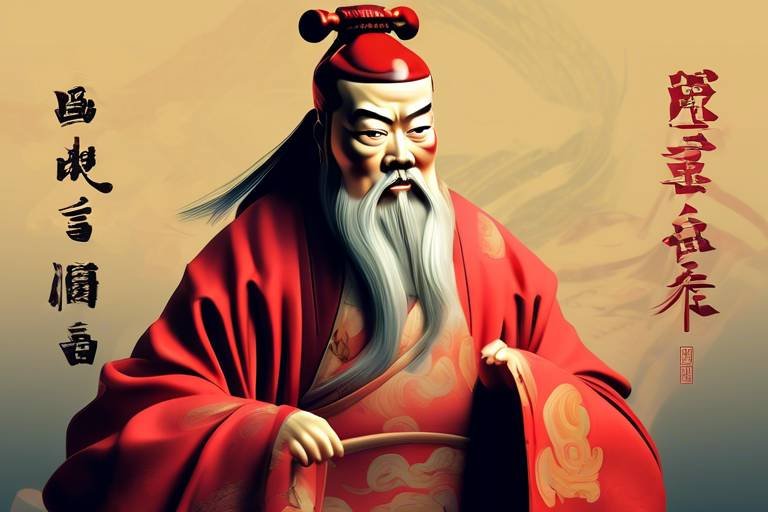Seneca: The Philosopher of Stoicism
Seneca, the Philosopher of Stoicism, stands as a towering figure in the realm of philosophy, revered for his profound insights into ethics, resilience, and the pursuit of a meaningful existence in harmony with the natural order of the universe. His teachings continue to resonate through the annals of time, offering timeless wisdom and guidance to those seeking a path to inner peace and virtue.

Early Life and Education
Exploring the life and teachings of Seneca, a prominent figure in Stoicism philosophy, known for his insights on ethics, resilience, and living a meaningful life in harmony with nature.
Seneca, born Lucius Annaeus Seneca in 4 BC in Cordoba, Spain, came from a wealthy Roman family. His father, Seneca the Elder, was a well-known orator and writer, which exposed Seneca to literature and rhetoric from a young age. Seneca's early education focused on philosophy, particularly Stoicism, under the guidance of his tutors. This formative period instilled in him a deep understanding of ethics, logic, and the pursuit of wisdom.
Examining the core tenets of Stoicism as espoused by Seneca, including virtue ethics, acceptance of fate, and the pursuit of inner tranquility.
Analyzing Seneca's influential writings such as Letters to Lucilius and On the Shortness of Life which offer practical wisdom for daily living.
Discussing how Seneca's Stoic teachings can be applied to modern challenges, personal growth, and cultivating resilience in the face of adversity.
Exploring Seneca's lasting impact on philosophy, literature, and psychology, as well as his role in shaping the Stoic movement through the ages.
Highlighting how Seneca's philosophy continues to resonate with contemporary thinkers, leaders, and individuals seeking a deeper understanding of life's complexities.
Examining the criticisms leveled against Seneca's character, ethics, and political involvements, as well as controversies surrounding his wealth and lifestyle choices.
Reflecting on the enduring relevance of Seneca's teachings in today's fast-paced world, and the lessons we can draw from his philosophy to lead more fulfilling lives.

Stoic Principles
Exploring the life and teachings of Seneca, a prominent figure in Stoicism philosophy, known for his insights on ethics, resilience, and living a meaningful life in harmony with nature.
Seneca's Stoicism revolves around fundamental principles that guide individuals towards a virtuous and tranquil life. At the core of his philosophy is the emphasis on virtue ethics, which prioritizes moral character and integrity in all actions. Seneca believed that true happiness comes from living in accordance with one's values and principles, rather than seeking external validation or material possessions.
Another key tenet of Stoicism, as elucidated by Seneca, is the acceptance of fate. He advocated for embracing life's uncertainties and challenges with equanimity, recognizing that some events are beyond our control. By acknowledging the impermanence of external circumstances, individuals can focus on cultivating inner strength and resilience.
Furthermore, Seneca emphasized the pursuit of inner tranquility amidst the chaos of the external world. Through practices such as self-reflection, mindfulness, and rationality, individuals can achieve a state of peace and contentment that is independent of external circumstances. Seneca's teachings encourage individuals to find serenity within themselves, regardless of external turmoil.
Seneca's philosophical legacy is encapsulated in his profound writings, including Letters to Lucilius and On the Shortness of Life. In these works, Seneca offers practical wisdom and philosophical insights that resonate with readers across generations. His letters to Lucilius, in particular, provide guidance on how to navigate life's challenges with wisdom and virtue, emphasizing the importance of self-improvement and ethical conduct.
The timeless wisdom of Seneca's Stoic philosophy can be applied to modern contexts, offering valuable insights for personal growth and resilience. By incorporating Seneca's teachings into daily life, individuals can cultivate a sense of inner peace, moral clarity, and emotional resilience. Seneca's emphasis on self-awareness, virtue, and acceptance of fate provides a practical framework for navigating the complexities of contemporary challenges.
Exploring Seneca's lasting impact on philosophy, literature, and psychology, as well as his role in shaping the Stoic movement through the ages.
Highlighting how Seneca's philosophy continues to resonate with contemporary thinkers, leaders, and individuals seeking a deeper understanding of life's complexities.
Examining the criticisms leveled against Seneca's character, ethics, and political involvements, as well as controversies surrounding his wealth and lifestyle choices.
Reflecting on the enduring relevance of Seneca's teachings in today's fast-paced world, and the lessons we can draw from his philosophy to lead more fulfilling lives.

Philosophical Works
Seneca, a towering figure in Stoic philosophy, left behind a rich legacy of philosophical works that continue to inspire and enlighten readers to this day. His writings, including the renowned Letters to Lucilius and On the Shortness of Life, delve into profound insights on how to navigate the complexities of human existence with wisdom and virtue.
In Letters to Lucilius, Seneca offers practical advice on how to live a life of virtue and integrity, emphasizing the importance of self-reflection, moderation, and resilience in the face of life's challenges. Through his letters, he imparts timeless lessons on how to cultivate inner peace and moral strength amidst the chaos of the world.
On the Shortness of Life delves into the fleeting nature of human existence, urging readers to seize the present moment and live fully in accordance with reason and virtue. Seneca's reflections on the brevity of life serve as a poignant reminder of the importance of prioritizing what truly matters and embracing the transient nature of our time on earth.
Seneca's philosophical works not only provide intellectual nourishment but also serve as practical guides for navigating the complexities of daily life. His emphasis on self-mastery, ethical living, and acceptance of fate resonates with readers seeking guidance on how to lead a more meaningful and fulfilling existence.

Letters to Lucilius
Exploring the life and teachings of Seneca, a prominent figure in Stoicism philosophy, known for his insights on ethics, resilience, and living a meaningful life in harmony with nature.
An overview of Seneca's background, upbringing, and education that shaped his philosophical views and approach to Stoicism.
Examining the core tenets of Stoicism as espoused by Seneca, including virtue ethics, acceptance of fate, and the pursuit of inner tranquility.
Analyzing Seneca's influential writings such as Letters to Lucilius and On the Shortness of Life which offer practical wisdom for daily living.
Discussing how Seneca's Stoic teachings can be applied to modern challenges, personal growth, and cultivating resilience in the face of adversity.
Exploring Seneca's lasting impact on philosophy, literature, and psychology, as well as his role in shaping the Stoic movement through the ages.
Highlighting how Seneca's philosophy continues to resonate with contemporary thinkers, leaders, and individuals seeking a deeper understanding of life's complexities.
Examining the criticisms leveled against Seneca's character, ethics, and political involvements, as well as controversies surrounding his wealth and lifestyle choices.
Reflecting on the enduring relevance of Seneca's teachings in today's fast-paced world, and the lessons we can draw from his philosophy to lead more fulfilling lives.
Seneca's Letters to Lucilius are a collection of moral epistles addressed to his friend Lucilius, offering practical advice on how to live a virtuous and content life. These letters provide insights into Stoic philosophy and serve as a guide for navigating life's challenges with wisdom and resilience.

and
Seneca, the esteemed philosopher of Stoicism, believed that embracing the concept of 'and' in life was essential for achieving harmony and balance. In his teachings, 'and' symbolized the acceptance of both positive and negative aspects of existence, emphasizing the importance of embracing all experiences, whether joyful or challenging. By acknowledging the duality of life, Seneca encouraged individuals to cultivate resilience and inner strength, recognizing that growth often arises from navigating through contrasting circumstances.

On the Shortness of Life
Exploring the life and teachings of Seneca, a prominent figure in Stoicism philosophy, known for his insights on ethics, resilience, and living a meaningful life in harmony with nature.
An overview of Seneca's background, upbringing, and education that shaped his philosophical views and approach to Stoicism.
Examining the core tenets of Stoicism as espoused by Seneca, including virtue ethics, acceptance of fate, and the pursuit of inner tranquility.
Analyzing Seneca's influential writings such as Letters to Lucilius and On the Shortness of Life which offer practical wisdom for daily living.
Discussing how Seneca's Stoic teachings can be applied to modern challenges, personal growth, and cultivating resilience in the face of adversity.
Exploring Seneca's lasting impact on philosophy, literature, and psychology, as well as his role in shaping the Stoic movement through the ages.
Highlighting how Seneca's philosophy continues to resonate with contemporary thinkers, leaders, and individuals seeking a deeper understanding of life's complexities.
Examining the criticisms leveled against Seneca's character, ethics, and political involvements, as well as controversies surrounding his wealth and lifestyle choices.
Reflecting on the enduring relevance of Seneca's teachings in today's fast-paced world, and the lessons we can draw from his philosophy to lead more fulfilling lives.
Seneca's work On the Shortness of Life delves into the concept of time and the brevity of human existence. He emphasizes the importance of living each moment fully and purposefully, as time is a precious and limited resource that should not be squandered. Seneca's insights challenge readers to reevaluate their priorities and make the most of the time they have, urging them to focus on what truly matters in life.

which offer practical wisdom for daily living.
Exploring the life and teachings of Seneca, a prominent figure in Stoicism philosophy, known for his insights on ethics, resilience, and living a meaningful life in harmony with nature.
An overview of Seneca's background, upbringing, and education that shaped his philosophical views and approach to Stoicism.
Examining the core tenets of Stoicism as espoused by Seneca, including virtue ethics, acceptance of fate, and the pursuit of inner tranquility.
Analyzing Seneca's influential writings such as Letters to Lucilius and On the Shortness of Life which offer practical wisdom for daily living.
Discussing how Seneca's Stoic teachings can be applied to modern challenges, personal growth, and cultivating resilience in the face of adversity.
Exploring Seneca's lasting impact on philosophy, literature, and psychology, as well as his role in shaping the Stoic movement through the ages.
Highlighting how Seneca's philosophy continues to resonate with contemporary thinkers, leaders, and individuals seeking a deeper understanding of life's complexities.
Examining the criticisms leveled against Seneca's character, ethics, and political involvements, as well as controversies surrounding his wealth and lifestyle choices.
Reflecting on the enduring relevance of Seneca's teachings in today's fast-paced world, and the lessons we can draw from his philosophy to lead more fulfilling lives.

Practical Applications
Seneca's Stoic teachings offer valuable insights that can be applied to various aspects of modern life, providing practical guidance for navigating challenges and fostering personal growth. One key practical application of Seneca's philosophy lies in the cultivation of resilience in the face of adversity. By embracing the Stoic principle of accepting what is beyond our control and focusing on our response to external events, individuals can develop a mindset of inner strength and equanimity.
Furthermore, Seneca's emphasis on virtue ethics underscores the importance of living a life guided by moral excellence and integrity. In practical terms, this translates to making conscious choices aligned with virtuous values such as honesty, courage, and compassion. By aligning our actions with these principles, we can cultivate a sense of purpose and fulfillment in our daily endeavors.
Seneca also highlights the significance of self-reflection and introspection in his philosophical works. Through practices such as journaling and contemplation, individuals can gain a deeper understanding of their emotions, motivations, and beliefs. This self-awareness not only fosters personal growth but also enables individuals to make informed decisions that are in harmony with their values and goals.
Moreover, Seneca's teachings on the importance of living in accordance with nature can be applied to modern lifestyle choices and environmental consciousness. By recognizing our interconnectedness with the natural world and striving for simplicity and moderation in our consumption habits, we can contribute to a more sustainable and harmonious existence.

Legacy and Influence
Seneca, the towering figure in Stoicism philosophy, left an indelible mark on the world with his profound insights on ethics, resilience, and the pursuit of a meaningful life in harmony with nature. His legacy continues to influence philosophy, literature, and psychology, shaping the way we approach challenges and seek inner tranquility.
Seneca's teachings have transcended time, resonating with contemporary thinkers, leaders, and individuals navigating the complexities of modern life. His philosophical works, including Letters to Lucilius and On the Shortness of Life, offer timeless wisdom that remains relevant in today's fast-paced world.
Through his emphasis on virtue ethics, acceptance of fate, and the cultivation of inner strength, Seneca's Stoic principles provide a guide for personal growth and resilience in the face of adversity. His practical applications of Stoicism offer valuable lessons on how to lead a more fulfilling and purposeful life.
Seneca's enduring influence extends beyond the realm of philosophy, as his ideas have permeated various aspects of society, from literature to psychology. His role in shaping the Stoic movement through the ages underscores the profound impact of his teachings on subsequent generations.
Despite facing criticisms and controversies surrounding his character, ethics, and wealth, Seneca's teachings remain a source of inspiration for those seeking a deeper understanding of life's challenges. His legacy serves as a testament to the power of philosophical wisdom in guiding individuals towards a more meaningful existence.

Modern Interpretations
Modern Interpretations of Seneca's philosophy continue to captivate contemporary thinkers, leaders, and individuals seeking profound insights into the complexities of life. His teachings on ethics, resilience, and the pursuit of inner tranquility resonate strongly in today's fast-paced world, offering a timeless guide for navigating the challenges of modern life. Many find solace in Seneca's emphasis on virtue ethics and the importance of living in alignment with one's values, even amidst societal pressures and distractions.

Criticism and Controversies
Seneca, despite his profound influence and revered status in Stoicism, has not been immune to criticism and controversies throughout history. One of the primary criticisms leveled against Seneca pertains to his perceived hypocrisy in advocating for a life of simplicity and virtue while amassing significant wealth and enjoying the luxuries of Roman high society. Critics have pointed to his close association with the notoriously extravagant Emperor Nero as evidence of moral compromise and opportunism.
Moreover, Seneca's involvement in politics and his role as Nero's advisor have raised ethical concerns regarding his willingness to condone or turn a blind eye to the emperor's tyrannical actions and atrocities. Some critics argue that Seneca's philosophical principles of virtue and integrity were compromised by his proximity to power and his failure to speak out against Nero's injustices.
Controversies surrounding Seneca's wealth and lifestyle choices have also sparked debates about the sincerity of his commitment to Stoic ideals. Despite advocating for detachment from material possessions and the transient nature of wealth, Seneca's own opulent lifestyle has been viewed as contradictory to his philosophical teachings, leading to questions about the authenticity of his beliefs.
While these criticisms and controversies have undoubtedly cast shadows on Seneca's legacy, they also serve as reminders of the complexities and contradictions inherent in human nature. By engaging with the criticisms against Seneca, we are prompted to critically evaluate the integrity of philosophical figures and the challenges of embodying ethical principles in a flawed world.

Relevance Today
Seneca's teachings on Stoicism continue to hold significant relevance in today's fast-paced and chaotic world. In a society filled with distractions and constant noise, Seneca's emphasis on inner tranquility and ethical living serves as a guiding light for many individuals seeking a sense of purpose and clarity.
One of the key aspects of Seneca's philosophy that resonates strongly today is his focus on the importance of self-reflection and introspection. In a world where superficiality often takes precedence over deep introspection, Seneca's teachings encourage individuals to look within themselves, confront their fears and desires, and strive for personal growth and self-improvement.
Moreover, Seneca's emphasis on resilience and the acceptance of fate offers valuable lessons for navigating the uncertainties and challenges of modern life. By embracing the concept of amor fati, or love of fate, individuals can cultivate a mindset of acceptance and adaptability, allowing them to face adversity with courage and grace.
Furthermore, Seneca's teachings on the transience of life and the importance of living in the present moment remind us to cherish each day and make the most of our time on earth. In a world consumed by materialism and the pursuit of external validation, Seneca's philosophy encourages us to prioritize what truly matters and find contentment in simplicity and virtue.
Overall, Seneca's timeless wisdom continues to inspire individuals across the globe to lead more meaningful and fulfilling lives, reminding us of the enduring power of philosophy to guide us in our quest for truth, virtue, and inner peace.
Frequently Asked Questions
- What is Stoicism?
Stoicism is a philosophical school of thought that emphasizes the importance of virtue, self-control, and acceptance of fate. It teaches individuals to focus on what is within their control and to let go of things beyond their power.
- Who was Seneca?
Seneca was a Roman philosopher, statesman, and playwright who played a significant role in the development of Stoicism. He is known for his philosophical works, including "Letters to Lucilius" and "On the Shortness of Life."
- What are the core principles of Stoicism according to Seneca?
Seneca believed in practicing virtue, accepting the inevitability of fate, and seeking inner peace through self-discipline and rational thinking. He emphasized the importance of living in accordance with nature and focusing on personal development.
- How can Seneca's teachings be applied in modern life?
Seneca's Stoic philosophy offers valuable insights for dealing with challenges, managing stress, and finding meaning in today's world. By practicing virtues such as courage, wisdom, justice, and temperance, individuals can cultivate resilience and lead more fulfilling lives.



















